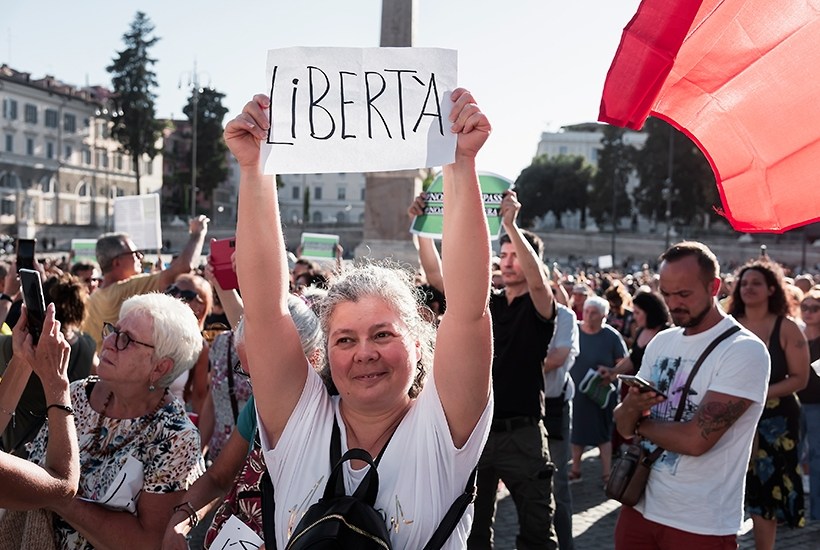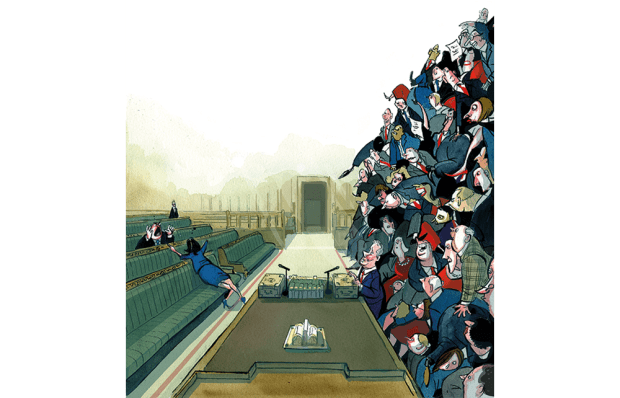Wage concern
Sir: Martin Vander Weyer’s call for higher wages to end the shortage of British HGV drivers (‘Your country needs you at the wheel of a lorry’, 7 August) should be extended to other hard-pressed economic areas which have lost cheap labour from the poorer EU countries. For far too long, farming, hospitality, construction, care homes and other vital services have failed to recruit and train local staff or pay a decent wage. Low wages at the bottom of the economy increase the cost of social welfare benefits, bring in less or no money from income tax and VAT and thus adversely affect the whole economy.
David Thompson
Capel St Mary, Suffolk
Growth industry
Sir: It is good news that companies paying minimum wages to farm labourers cannot get the workers they need (Any other business, 7 August). The British workers are there, but employers are going to have to pay more to them than they could get away with paying eastern European workers. This will mean that employers will have to find ways of using better paid and better equipped workers to make them more productive. Many older readers will remember when boys were allowed to skip school so that they could help lift the potato crop by hand in the early 1950s. Now farmers lift the crop very efficiently with machinery and sell potatoes at an amazingly low price. That is how capitalism works to everyone’s advantage: not by importing cheap foreign labour.
John Mustoe
Thurleigh, Beds
Rome truths
Sir: It is misleading to suggest that demonstrators have ‘filled squares throughout the country’ in Italy (‘That’s amoral’, 7 August). The impression given that tens of thousands of Italians have taken to the streets as they have in France is false. The largest demonstration so far took place in Milan on Saturday and was attended by a paltry 5,000 people. The Italians are just not bothered. More than two thirds of over-12s have now had one dose of the vaccine and the prospect of social exclusion has got the unvaccinated queuing up to get their jabs. I have had two doses of the vaccine (Moderna) and am in favour of it, but I am against making it compulsory. It is such a grave violation of individual liberty, yet few in Italy seem to care: 72 per cent of Italians are in favour of the Green Pass, according to a poll commissioned by the state broadcaster RAI, and only 23 per cent against. Understanding why Italians seem so unconcerned about their liberty, despite living so relatively recently under a fascist dictatorship, is not easy. But no doubt the heat has a lot to do with it. For liberty has never flourished, as Montesquieu noted, where the orange grows.
Nicholas Farrell
Dante’s Beach, Ravenna, Italy
Radio gaga
Sir: The decline in the soap opera identified by Nicholas Barrow (‘Serial offenders’, 31 July) extends to Radio 4. The Archers was once billed as ‘an everyday story of country folk’. Those folk now behave in increasingly uncharacteristic ways to accommodate unbelievable storylines. Some of these are designed to touch on topical issues; others inject implausible, extreme drama; and others try (and mostly fail) to be funny.
Helen’s domestic abuse by Rob and Elizabeth’s depression are examples of plausible storylines handled well, but these are now a rarity. There is no indication that these attempts to make Ambridge more exciting or ‘relevant’ are attracting new, younger listeners, but every sign that those who have followed along for decades are starting to switch off.
Robert Beauchamp
Colchester, Essex
Charity case
Sir: I feel sorry for Cosmo Landesman (‘Lost cause’, 7 August). I tried to volunteer too, for SSAFA — the armed forces charity — as a form of volunteer outreach worker. I’d served in the army for 24 years and thought I knew a little about it. I attended a local one-day volunteering course at RAF Halton in Buckinghamshire. I was informed I was just what they were looking for and they would be in touch within a week. That was in 2008, and I’m still waiting.
Michael Wingert
High Wycombe, Bucks
Greek myths
Sir: Charles Moore wonders (The Spectator’s Notes, 10 July) whether James Harpur’s The Examined Life marks the end of a tradition of classical scholarship that ‘built the public schools’, asserting, with Stephen Fry, that Harpur is ‘the last scholar of Ancient Greek that [Cranleigh School] will ever send to Oxbridge’. I am delighted to say that nothing could be further from the truth: this year alone has seen two Cranleighan Hellenists graduate from Cambridge. Indeed, with Greek taught in all year groups at Cranleigh, reports of our demise may remain exaggerated for some time to come yet.
Dr Dan Hogg
Head of Classics, Cranleigh School
A toast to Jeremy
Sir: I would like to add my name to Charlie Newington-Bridges’s reader survey (Letters, 24 July). It was Jeffrey Bernard’s Low Life column that first convinced me to approach each issue ‘back to front’ and upon his demise I was sure that the void would never be adequately filled; how happy I am to say how wrong I was. Jeremy Clarke’s columns (and books) have been a complete joy, handmade in the manner of an artisan watchmaker, with the utmost patience, delicacy and precision. I raise my not inconsiderable glass to you Jeremy, with very many thanks.
Andy Tarry
Dartmoor, Devon
Got something to add? Join the discussion and comment below.
Get 10 issues for just $10
Subscribe to The Spectator Australia today for the next 10 magazine issues, plus full online access, for just $10.
You might disagree with half of it, but you’ll enjoy reading all of it. Try your first month for free, then just $2 a week for the remainder of your first year.














Comments
Don't miss out
Join the conversation with other Spectator Australia readers. Subscribe to leave a comment.
SUBSCRIBEAlready a subscriber? Log in